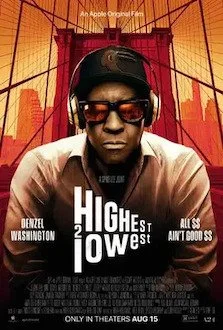Direction: Spike Lee
Country: USA
Based on Akira Kurosawa’s High and Low (1963), Highest 2 Lowest marks another misguided adaptation from Spike Lee, following his failed take on Oldboy (2013). It reunites him with Denzel Washington after 19 years, their last collaboration being Inside Man (2006), preceded by Mo’ Better Blues (1990), Malcolm X (1992), and He Got Game (1998).
The story centers on David King (Washington), a Bronx-born music mogul whose life spirals when his teenage son, Trey (Aubrey Joseph), is kidnapped for a ransom of $17.5 million. Screenwriter Alan Fox transplants Kurosawa’s tale into the American music industry, touching on themes of friendship, family, moral dilemma, and career. Yet the staging is so deficient and uninspired that the film never rises above mediocrity.
Undercutting the drama is a faulty score by Howard Drossin and Fergus McCreadie, which consistently fails to heighten tension, alongside an unappealing soundtrack featuring tracks by ASAP Rocky (who also stars) and Jensen McRae. The lone exception is a live performance by the late Latin-jazz pianist Eddie Palmieri, whose rendition of “Puerto Rico” stands out as a poignant posthumous tribute.
Instead of three-dimensional characters, Highest 2 Lowest gives us wax ones with zero chemistry. Nobody is really stepping outside their comfort zones. Therefore, when you should be clenching your fists with emotion, you only end up shrugging as everything seems unnaturally staged.
Dragged out over two-plus formulaic hours, the film underscores Lee’s vertiginous decline. He has never made films in a predictable way, but here he is once again a hostage of his own misconceptions.












